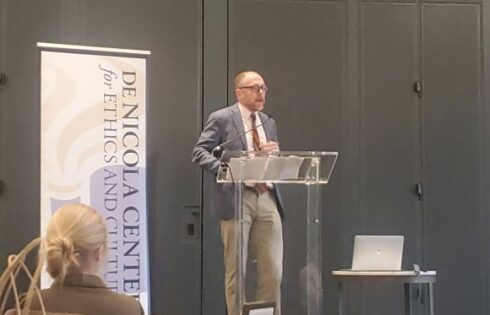
Armed robbers, murderers reside at the prison
Georgetown University recently announced it would expand its non-degree prison education program to include one that can lead to a college degree.
It is an expansion of the partnership it has with Patuxent Institution, a state maximum-security prison in Maryland, that houses convicted murderers and armed robbers, among other criminals.
“Our goal is to provide the same rigorous, demanding courses of study inside of the prison that make a Georgetown education world-class,” Josh Miller, director of education with the Jesuit university’s Prison and Justice Initiative, said in the news release.
University president John DeGoia said “we have a responsibility to advance the common good and empower the members of our community to share in this important work.”
Some of the prisoners there have “severe character disorders and “typically have a history of substance dependency,” according to the Maryland Department of Public Safety and Correctional Services. Though its focus is on preparing offenders for re-entry into society, some of the inmates at the institution will likely be there for many years.
MORE: Group wants prisoners eligible for Tufts degree
Potential degree applicants include Eugene Genius, who was sentenced to 30-years in prison and assigned to the Institution for the felony murder of a county police officer named Amy Caprio.
Another could be Ahmaad Jones, arrested multiple times for armed robbery, and current inmate at Patuxent.
The Catholic university said the degree program will be open to prisoners in Maryland state prisons — however, there is no information that indicates the murderers and robbers would not be allowed to participate.
A majority of the program’s funding comes from a three-year grant for $1 million from the Andrew W. Mellon Foundation and another donor, Damien Dwin. Inmates also have access to a Pell Grant program for prisoners.
The College Fix emailed Evelyn Rupert, Georgetown’s listed contact for press questions on the program, and asked about eligibility for the degree.
The Fix also asked, in two emails over the past three weeks, for examples of the effectiveness of the college degree program at other schools and what the vetting process for applicants entailed. She did not respond to any of the emails.
Some evidence of effectiveness of education programs in prisons
While the university said that the program will help reduce recidivism, it would not provide further details or research on the program’s efficacy.
However, one prison fellowship program said its academy has had success in reducing recidivism.
A spokesperson for the Prison Fellowship said one study found that Texas graduates of its Prison Fellowship Academy “were found to be 17 percent less likely than their non-Academy peers to be re-arrested.”
The study also found participants were “12 percent less likely to be re-incarcerated, during the two-year period following their release from prison,” according to a statement provided by spokesperson Angela Davis.
Another study by the Minnesota Department of Corrections found “graduates of the full program had a recidivism rate of 0.8 percent, compared to the state average of 40 percent,” according to the fellowship’s spokesperson.
“A companion study, led by Dr. Byron Johnson of Baylor University, reported that our program in Minnesota resulted in a benefit of $3 million for the state,” Davis told The College Fix via email.
The College Fix could only locate links for Johnson’s study. The nonprofit did not respond to a follow-up email on April 26 asking for sources for their claims.
The statement provided to The Fix is a standard statement on the group’s website, but none of the statements reviewed provided links to studies.
MORE: Christian colleges push for prisoners to get federal student aid
IMAGE: Side One Cincy/Flickr
Like The College Fix on Facebook / Follow us on Twitter





Please join the conversation about our stories on Facebook, Twitter, Instagram, Reddit, MeWe, Rumble, Gab, Minds and Gettr.